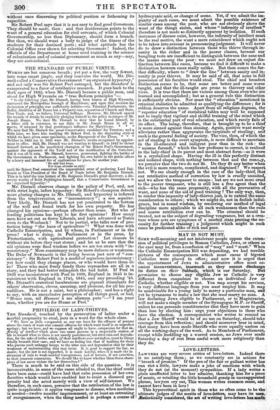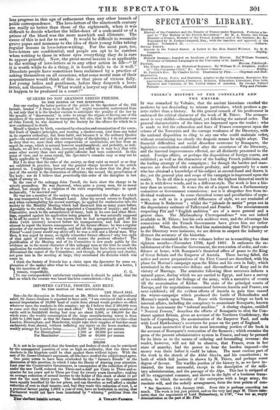LOVE-LETTERS.
LAWYERS are very severe critics of love-letters. Indeed there is no satisfying them ; as we constantly see in actions for "breach of promise." If the pen of the fair or gallant writer luis run riot a little, lawyers make a joke of emotions with which they do not (at the moment) sympathize. If a lady writes a plain unaffected letter to her admirer, thanking him for a piece of music, or retailing the little household gossip m unexaggerated' phrase, lawyers cry out, This woman writes common sense, and cannot have been in love!
This hypercritical spirit in those who so often come to be thol ultimate judges of the merits of love-letters, may have its uses.; iliethetically considered, the art of writing love-letters has***
less progress in this age of refinement than any other branch of polite correspondence. The love-letters of the nineteenth century are really no better than those of the eighteenth, when it was difficult to decide whether the billet-doux of a cook-maid or of a prince of the blood was the more mawkish and illiterate. The cause of this is not far to seek. It would be difficult to reconcile grave papas and mammas to the idea of their young folks taking regular lessons in love-letter-writing. For the most part, too, love-letters are confidential; and people are apt to be careless when writing to those in whose eyes everything they do is sure Co appear graceful. Now, the great moral maxim is as applicable to the writing of love-letters as to any other action in hfe--" If it is worth while to do a thing, it is worth while to do it well." Dissolute people have sometimes been reclaimed by a practice of asking themselves on all occasions, what some moral man of their acquamtance would think of this or that piece of vicious folly. Let young ladies and gentlemen, before they despatch a love- letter, ask themselves, What would a lawyer say of this, should tit happen to be produced in a court?"



























 Previous page
Previous page